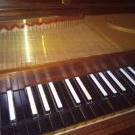Leaderboard
Popular Content
Showing content with the highest reputation on 10/12/2025 in all areas
-
Dude you're perfect for youtube, and I think you reach an audience that helps people find how great "classical" music is. Your editing is great, and you're pretty funny. I'm excited to hear you mentioning your original work too, that'll be great for your channel. Awesome stuff, you've got a great personality in your videos!3 points
-
Aw that's super sweet of youuu Thank you very much One of my goals when starting this channel was exactly that, to get people to actually sit down and listen to the "nerdy" classical music, because it's SO GOTDAMN GOOD PEOPLE ARE MISSING OUT2 points
-
I really love The Nutcracker Suite, or "Waltz of the Flowers" by Tchaikovsky to be fair, I often times am very bored in class, maybe I'll get one of those notebooks that have a staff in them, and print out a piece or two, and just sit down and write them thank you for your words of advice!2 points
-
You must have orchestral pieces that you really like? Maybe even, like, film scores or musical theater scores? When I first got started soooooo long ago, I would spend hours listening, replaying, transcribing, and writing everything that I heard. And holy hell, I definitely got better because I was engaging my brain in piecing everything together. Copying note-for-note is alright (as long as you're listening alongside it), but transcribing it arguably even better. And, bonus, you get to practice transcription too! But yeah, basically, don't be so beholden to the original work, is my biggest advice. There's a reason that every collegiate composition course in the world has you take a very, very short piano miniature and orchestrate it. I remember my class took Ligeti's Musica ricercata, II., and orchestrated it. Super short, and literally only three notes. It was hard. But with practice—and creativity—it all comes together.2 points
-
thank you very much! I've actually heard of this method of litterally writing down by hand existing works, and even have done it a few times, sadly I really don't think I'll have the time in the near future to write down an entire orchastral score I'd definetly go over his version and study it though, thank you for the kind comment2 points
-
So, you should take a look at probably the most famous orchestration of this piece by Caplet: https://www.youtube.com/watch?v=5DB8rBvyPoE And I'm gonna suggest something really boring, but if you have an extra few hours, I'd go and like copy all of this—like, note for note. By hand, if you can, just to get it in your hands and brain what instruments go where and what they're best at doing (possibly even better if you try to transcribe it, then check your work). You've got some pretty good foundations for what makes an orchestral work tick, which is a great start (e.g., you mention adding more instruments to make the piece feel fuller), but you'll notice that there are so many times where what's written deviates from the piano score. Like at 3:05, when the main theme comes back in, Caplet adds these gorgeous violin solo notes to add chord pitches (that aren't even in the original!), a sustained note in a sing-song register, and serve as counterpoint. Also, going into 3/4 in half the orchestra at 1:00, while everyone else stays in 9/8? What a cool effect! And the best part is, you'll get to see where you and he align on your choices! For example, at 3:08, you actually agreed that double flutes would work, but I believe you changed it to flute and clarinet in the final version of yours. It's worth taking the opportunity here to also improve standard notation practices. Like in the first measure, in 9/8 you can't actually have any half notes because 9/8 is representing triplet compound meter, so three dotted half notes need to be visually represented. Little things like that go a long way. You have a good budding ear for what makes orchestral works sound so pretty and grand, but you can take this opportunity to really reinforce that knowledge with score study and practice. The theory of it doesn't really matter (lessons on acoustics and stuff have always been super boring to me); what matters is knowing what things pair well and knowing when to use those tools. Best of luck and keep at it.2 points
-
this on the other hand I do somewhat appreciate , I still don't think you should be calling anybody's work cringe, even if it absolotly is, but I do appreciate you pointing out the fact I'm not really learning anything new in those videos, because I do strive to learn and improve. my next video is planned to be an original composition, with that reason being one of the reasons I chose to switch the style up a bit. with that being said again it's a youtube video sometimes people just do nonsense on youtube videos that's also fine as long as they're having fun which I was.2 points
-
2 points
-
2 points
-
2 points
-
Hello, sorry, I thought the platform translated, here it is in English: Hello, I'm sharing my piece for string quartet, "Clowns," inspired by a group of killer clowns having fun on Halloween. I'd like to clarify that the audio is MIDI, as the piece wasn't recorded. It should be around 3.30 minutes long, this one a little faster. Best regards!2 points
-
"Hello, I'm sharing my piece for string quartet, "Clowns," inspired by a group of killer clowns having fun on Halloween. I'd like to clarify that the audio is MIDI, as the piece wasn't recorded. It should be around 3.30 minutes long, this one a little faster. Best regards!"2 points
-
2 points
-
I don’t have the score for all three of these so bear with me. unfortunately my videography sucks too and i think i often record in a way that makes the instrument sound pingy. anyway, tell me which one you hate the least1 point
-
https://drive.google.com/file/d/1E95RnOKWCMVCMPWCWMqY-9PNRoRQzehM/view?usp=sharing https://drive.google.com/file/d/164YfVymnJtBmFQ4EevbzOoUsS0IATGuC/view?usp=sharing Hola comparto mi pieza para cuarteto de cuerdas "Clowns", inspirada en un conjunto de payasos asesinos que se divierten en noche de brujas. Aclaro que el audio es midi ya que la obra no fue grabada. Su duración debería rondar los 3.30 aproximadamente este un poco más rápido. ¡Saludos cordiales! Hello, sorry, I thought the platform translated, here it is in English: Hello, I'm sharing my piece for string quartet, "Clowns," inspired by a group of killer clowns having fun on Halloween. I'd like to clarify that the audio is MIDI, as the piece wasn't recorded. It should be around 3.30 minutes long, this one a little faster. Best regards!1 point
-
This is a song, Tolkien setting, I wrote in 1993 at the age of 24, and recently arranged as a tone poem for string orchestra. It is so dissonant that the music scares the composer! Eb Minor might be considered a weird key to begin with, but even I have trouble telling what key it is in! Not atonal, post-mahlerian perhaps, but it is about swamp monsters that eat you, so... The Mewlips-Tone Poem for String Orchestra Free Sheet Music by Robert C. Fox for Various Instruments | Noteflight The poem is posted in the Noteflight comments, so you can follow the music with the words, if you can stand to listen to it; again, it scares me!1 point
-
Birds Like Minor Thirds-Interval Teaching Catch Free Sheet Music by W.A. Mozart, transcribed by Robert Fox, and the birds. for Various Instruments | Noteflight Just for fun, s*its and giggles...1 point
-
https://musescore.com/user/96214813/scores/28339009. This is my work. It is a theme of variations piece of music. It has a length of exactly 5 minutes. It consists of an introducion, a theme, and thirteen variations (coda in last variation). It is written for two pianos and a violin, and it also has a cadenza for both types of instruments.1 point
-
https://drive.google.com/drive/folders/1TZJ7a6jue0wpKBrUJ4AWOg8HYsBcfwSd?usp=sharing This is my submission for the 2025 Halloween Composition Competition, Woodwind Quintet No. 1. When I composed the fast section of the piece, it had a bossa nova feel. I liked this feel enough to want to develop it further. I decided to slow it down in sketch form, and the result was something that sounded like a happy-go-lucky, yet sinister, ice cream truck.1 point
-
1 point
-
I also support your idea of ''getting people to actually sit down and listen to the "nerdy" classical music, because it's SO GOTDAMN GOOD PEOPLE ARE MISSING OUT''. I like this idea!1 point
-
I recommend also making videos on like... less known stuff? Like the Waltz B.21 by Frederyk Chopin. Or this one! Make it in to a solo piano piece! . Or try orchestrating Op. 46 Allegro de Concert by Frederyk Chopin. It was intended to be a concerto anyways...1 point
-
1 point
-
I don't think it's that much of a crime to call a piano song "a piece" I do bealive it is the most beautiful piece ever written, so I don't feel regrets calling it that but even if I didn't it's youtube, people sometimes use catchy titles, no need to go insane about it I undrastand that you're trying to help, but that's not how I'd define support. same with reason three, yes, I make jokes, yes, I don't explain every little thing like a harvard composition teacher, again it's a youtube video1 point
-
This is easy. 10 out of 10. Simply outstanding. And a perfect five minutes? Great. 10 out of 10. Winner here. (This is just a joke lol)1 point
-
I stood it. It's not bad at all, but a bit directionless to my taste. I suppose that it happens a lot more than I realise with incidental music? I don't know. There were bits that I liked more, others not so much. Again, if I had to point something out, it would be the lack of dynamics throghout the whole piece. A new dimension of nuances awaits there. Hope noteflight would improve the playback system, but it's not that bad anyway if you've enjoyed OSTs from 90s-00s videogames. In fact it kind of rings a bell in that regard. Despite of the seemingly random pauses, the music itself has some continuity. I liked specially the M84-M92. But a question arises: why keeping the key of this piece if it diverts that far away from it? I myself do that as well, but I'm just curious about your thoughts. Finally, I did like the add9 in that Eb at the end. It's a bit contrasting, sounds like the bad trip is over. Regards!1 point
-
Hi again @Tunndy! I've watched all your "orchasrations" so far and I have to ask: are you learning anything from this process? It seems like all you're doing is importing midi's of the piano pieces into an orchestra template and copying and pasting the different parts into various instruments, essentially just doubling the parts, mostly in the same register as the original. But there's so much more to orchestration. In your orchestrations, you always include the piano part in the final finished orchestration, but I think a real test of whether you can effectively turn piano pieces into orchestra pieces would be if you excluded the piano from the orchestration. Let's see if the orchestration can stand on its own, without the piano! There were plenty of opportunities in this piece to use the string orchestra really dynamically, to create something that is quite different from the original piano piece. Like when Debussy stacks the F and Ab dyads in various registers, each an octave higher than the previous: I think you could have used the string orchestra really dynamically here by using the Violas, 2nd Violins, and 1st Violins to sustain those dyads and create a rich chord. That's just one example. But I don't think you're learning any of these techniques with the way you're orchestrating these pieces. And, honestly, I find your "orchastration" videos kinda cringe. 😕 Thanks for sharing though and if you do learn something from doing this then by all means, keep going!1 point
-
Hey @gaspard! Nice Saltarellos! I know tennis is listed as one of your hobbies, but why does it always seem like you're dressed in tennis clothes when you record your videos? LoL! First one - I like how quickly you can cycle through different seemingly unrelated keys in this kind of style of writing. I like the timbral change in the second one that you bring about by the change from the very low to the very high register of the instrument. But besides the sudden register change in the beginning all the other changes are done very smoothly. The third one has some cool canonic imitation between the hands. Thanks for sharing!1 point
-
I finally present to you a movement from my big variations project that I've had brewing since early 2024! Emboldened by the success of my "Deck the Halls" Variations I sought out more popular themes that I could write variations on. Originally I only intended to write variations on the Returner's March, but it soon grew out of all proportion when I started noticing all the little motivic relations between different themes so I had to include more. This is meant as a hybrid variations fantasy, medley, and mash-up of the themes that you can listen to here: The original themes were written by the great Nobuo Uematsu so my variations retain a certain Japanese flavor. In fact the first half of this Scherzo is subtitled "Asiatic". The Scherzo proper doesn't start until 6:01. I welcome any of your suggestions, critiques, comments or just observations. Thanks for listening and I hope you enjoy! P.S.: I'd like to thank my friends @chopin, @Henry Ng Tsz Kiu, @Thatguy v2.0 and @gaspard for their time, advice, and support throughout the composition process!1 point
-
listening now and i really dig. I know i’ve said my opinion of the original themes from ff is that they’re rather generic but you make really creative variations out of it.1 point
-
Can you provide an English version of the programme notes? Thx! Henry1 point
-
Excelente trabajo, ¡sigue así! 😀 (Bienvenido = welcome (singular) | Bienvenidos = welcome (plural)) ¡Genial! Ánimo con ello y bienvenido al foro Sebastián. Si tienes cualquier consulta, no dudes en escribirnos al privado, preguntar por el chat, o en este mismo hilo. ¡Un saludo!1 point
-
1 point
-
Double stops These usually cannot be used in quick succession, but if one note stays as a pedal tone, it is usable, either from a 3rd to a 5th or a 5th to a 7th within one position. Although sudden bursts are easier. See Prokofiev Symphony-Concerto 2nd mvmt cadenza for examples (yes, I know it is one of the hardest pieces ever written for cello) Harmonics on cello have the exact range as flute. note that only the distance between the two fingers matter: the range is the same for both touch-4 and touch-5. lowest notes per string C string: B3 G string: F#4 D string: C#5 A string: G#51 point
-
A little update. Now working on the six pieces "The Adorned Zither" Henry1 point
-
Hi all. Here's the latest version of this work. Let me know if you think it's going in the right direction? I've made it more harmonically adventurous I think. Just wonder whether my chord progressions work; or if they're a bit too silly? I was trying to use secondary dominants and secondary sub-dominants. The 1st movement probably needs some massaging to make the transitions work better. The 2nd movement is probably incomplete, unless I decide to leave it with its current ambiguous conclusion. The opening of the 3rd movement was constructed by applying negative harmony to the 1st movement. The piano chords will eventually be shared amongst the woodwind, brass and available strings. What I'm aiming for, is a modern take on Vivaldi that's not pastiche. Something a bit like "The Capriol Suite" perhaps.1 point
-
Hey @Alex Weidmann! I think I personally wouldn't use the chord sequence function in Musescore (if I was composing on the computer) because it would prevent me from trying to imagine what kind of stuff I could use to fill the sonic spaces of the music. Also, later, when I would want to add more parts to the piece I would probably have become accustomed to the harmony and I'd become inflexible to use different harmonic/accompanimental ideas. In general though, the reason why I prefer nowadays to write my music on paper is because I found that being able to immediately hear what I'm composing was not conducive to composing. Like in creative writing - it's like the difference between the brainstorming or quick-writing mindset and the editing and proofreading mindset. In the brainstorming or quick-writing mindset you just throw out all ideas no matter how bizarre or impractical - the goal is to just keep writing and keep the pencil moving. In the editing and proofreading mindset you weed out all the little mistakes, grammar, punctuation, spelling etc. If I compose music on the computer the two mindsets interfere with each other too much. When I'm using Musescore I'm almost always already in the editing/proofreading mindset. It's because hearing my music immediately puts me in that editing/proofreading mindset before I even have a chance to complete my musical thoughts as they were meant to be conceived. It's distracting for me. But this has turned into a rant. I can't tell what piece this was inspired by - maybe something by Vivaldi or Bach? Some of the melodic ideas are interesting! The reason why I guessed Vivaldi or Bach is because of the Baroque-like sequences you employ in some parts. But where's the soloist? Thanks for sharing!1 point
-
1 point
-
I share the black cat, a work inspired by the story by Edgar Allan Poe. In The Black Cat, Edgar Allan Poe constructs a deeply disturbing tale of moral degradation, crime, and the weight of guilt. The story is narrated in the first person by a man who, from the beginning, warns the reader that he is about to tell a disturbing and unbelievable story. This choice of narrator is key to understanding the story: everything we know is filtered through the protagonist's mind, creating a sense of uncertainty and unease from the outset. The reader is confronted not only by the narrated events but also by the internal struggle of a man who has lost control of himself. https://drive.google.com/file/d/1ePnpv39D7JGpKSfpBJl4u_exPrjCPx2D/view?usp=sharing0 points

.thumb.png.8b5b433a341551e913a34392660bc95b.png)


.thumb.png.1e2763f479362bbb522da50d31ef2e50.png)




